The value orientation of a person is highly likely to have consequences in his/her attitudes and behavior. The study reported in this paper examined the ecological/environmental value orientations of prospective secondary school teachers enrolled at Addis Ababa University for a one year Postgraduate Diploma in Teaching (PGDT) program. An environmental and sustainability literacy questionnaire (ESLQ) was used to measure the awareness and views of participants on key environmental/ecological issues and concerns. The 15 items that make up the New Ecological Paradigm Scale have been included in the ESLQ as they are. This paper reports findings related to participants' entry profile and their views about key environmental/ecological issues. The results show two interesting trends with regard to participants' ecological value orientations. First, both the eight pro-NEP and the seven pro-DSP statements have been endorsed. Second, the level of agreement with the two apparently contradictory groups of statements happened to be almost exactly the same (with an average of 67.1% endorsement for pro-NEP statements and strikingly equal level of endorsement of 67.4% for pro-DSP statements). The findings thus show that the prospective secondary school teachers hold a syncretic (NEP plus HEP) not a dualistic (NEP vs. HEP) worldview. In fact, a closer look into the patterns of responses to the five categories of statements shows that respondents had, on average, a pro-DSP worldview in four of the five categories. The only category where respondents had a pro-NEP view relates to 'possibility of eco-crisis'.
Key words: Dominant social paradigm, ecological value orientations, green development, new ecological paradigm, prospective teachers.
Value orientations and pro-ecological behavior
It has long been argued that traditional philosophical (and theological) views on the human relationship with nature have contributed to environmental destruction and degradation (Jardins, 2001). Achieving the goals of a sustainable future therefore requires reaching peoples deep convictions and their emotions, which partake in ethical values (Szagun and Mesenholl, 1993). This is because an individual's action in favor of or against ecological balance is believed to depend largely on values acquired in the course of his/her life. Putnam (2006) suggests that environmental paradigms influence an individual’s frequency of pro-environmental behavior. Job (1996) also underscores that the 'means to adjusting our lives to avoid abuses of the planet appear to entail not merely different ways of doing, but different ways of being'. With regard to people's action for or against ecology, it is specifically noted that what people do about their ecology depends on what they think about themselves in relation to things around them (White, 1967). Values, in general, are considered as criteria not only for guiding action but also developing and maintaining attitudes toward relevant objects and situations (Stern and Dietz, 1994).
With regard to development and/or inculcation of pro-environmental/pro-ecological values, it is essential to understand when a person starts acquiring and develop-ing a value system. Stern and Dietz (1994) suggest that value orientations take shape during the socialization process and are fairly stable in adults.
It is also important to underline here that values and beliefs may not lead in a straightforward way to attitudes because social influence agents, including acquaint-tances, the mass media, and social movements, may manipulate individuals' attention or focus so as to affect the ways they construct their preferences and thereby influence their opinions and actions (Stern and Dietz, 1994). A point of equal importance is that value orienta-tions may vary across individuals, social-structural groups and cultures.
The major value orientations
From the perspective of environmental/ecological values, Stern and Dietz (1994) make a very helpful distinction between three types of value orientations: egoistic, social-altruistic and biospheric. Egoistic values predis-pose people to protect aspects of the environment that affect them personally, or to oppose protection of the environment if the personal costs are perceived as high. The egoistic value orientation assumes that the motiva-tion for pro-environmental action is predominantly econo-mic and socio-biological and that the ultimate motivation for pro-environmental action is the benefit to be gained by the individual (Watson and Halse, 2005). The second model, altruistic value orientation, presumes that people act on social-altruistic values that may come with moral imperatives such as the Golden Rule: 'Do unto others as you would have them do unto you'.
People who apply such values judge phenomena on the basis of costs or benefits for a human group (for example, an ethnic group) or all humanity. In the case of the third model, biospheric value orientation, people judge phenomena on the basis of costs or benefits to ecosystems or the biosphere. Watson and Halse (2005) suggest that the biospheric orientation reflects the motivation of the ‘deep ecologists’ whose primary motivation for proenvironmental action is the welfare of ecological systems. In fact, Szagun and Mesenholl (1993) suggest that ethical concerns may be 'strong motivations for preserving nature, possibly more so than enjoyment of nature'.
In general, people would commit themselves to action when pro-environmental personal norms were activated by beliefs that an environmental condition has adverse consequences for self and close kin (in the egoistic value orientation), for other human beings (in the social-altruistic orientation), or for other species or ecological systems (in the biospheric orientation), and by ascription of responsibility to themselves for preventing those consequences (Stern and Dietz, 1994).
The DSP vis-à-vis NEP
The past two to three decades saw a growing body of research conducted to see the relationship between value orientations and pro-environmental/ecological actions though such researches were mostly conducted in advanced industrial countries. In relation to this, it has been underlined that modern research into environmental values is predominantly western in origin, and the Dominant Social Paradigm (DSP) and the New Environmental Paradigm (NEP) as theoretical concepts have been formulated and developed in the United States (Stern et al., 1995; Ojomo, 2011). The DSP entails, among other things, a belief in limitless resources; continuous progress, and the necessity of growth; faith in the problem solving abilities of science and technology; and strong emotional commitment to a laissez-faire economy and to sanctity of private property rights (Albrecht et al., 1982 cited in Erdogan, 2009). The DSP is also said to be characterized by consumerism, rationalism, utilitarianism and reductionism (Job, 1996). The NEP worldview on the other hand, is based on high valuation of nature; generalized compassion toward other species, other people and other generations; careful planning and acting to avoid risks to humans and nature; recognition that there are limits to growth to which humans must adapt; new society with cooperation, openness and participation; and consultative and participatory new politics emphasizing on foresight and planning (Milbrath, 1984 cited in Erdogan, 2009).
A dualistic vis-à-vis syncretic worldview
Some scholars argue that the NEP is nothing new in nonwestern and non-industrialized societies (Corral-Verdugo and Armendariz, 2000). It is often said that indigenous, non-industrialized societies tend to believe in the profound connection between humanity and nature. In contrast, in western or European societies, dualism permeates peoples’ environmental beliefs. It was sugges-ted, for instance, that the pro-Human Exceptionalism Paradigm - (HEP) would be closely allied with consumerism and the related concept of technocratic modernity (Colwell, 1997 cited in Corral-Verdugo and Armendariz, 2000), whereas pro-NEP view would be allied with the post-materialist values of frugality and conservation. As people in industrially advanced societies tend to base their attitudes on just one of the paradigms, those who follow the NEP would be the ecologically oriented in western communities (Corral-Verdugo and Armendariz, 2000).
Corral-Verdugo and Armendariz (2000) also indicate that the results of their study reflect the dualistic nature of North American culture and the more ecological vision of the Latin American belief systems. Whereas Americans conceive of the world as either pro-NEP or pro-HEP, for Brazilians, there is no conflict in holding both belief systems thereby reflecting a syncretic, ecological vision, by which some societies find compatibility between the natural balance and the needs of humans (using natural resources). A study from Mexico (Corral-Verdugo and Armendariz, 2000) indicates that the agreement with pro-NEP items was higher than the agreement with the pro-HEP items, implying that the community is more committed to preserving the environment than to a utilitarian view of nature. However, the participants of this Mexican community did not see a major conflict between these two apparently opposing views. In Mexico, 'individuals can be concerned with a natural balance- the negative human impact on the environment and, at the same time, believe in humans’ control over nature and be interested in possible profits they could obtain from nature'(Corral-Verdugo and Armendariz, 2000).
Another study (Watson and Halse, 2005) was conducted to see if the NEP scale has equal relevance in non-industrial societies by investigating the environment-tal attitudes held by pre-service teachers in three communities, one each from Australia, Republic of Maldives and Indonesia, and to compare the similarities and differences between the countries. The results indicate that Australian respondents viewed environ-ments from a deep ecological perspective when compared with Maldivian respondents (Watson and Halse, 2005). The Australian and Indonesian respon-dents also tended to consider environments as a balance between the needs of humans and the needs of environments while the Maldivian sample was considered as less altruistic. The Australian respondents tended to agree that environments should not be dominated by human need. The Maldivian respondents, however, appear to place more importance on human need when their views were compared with Australian respondents, while the views of the Indonesian respondents lay in between and significantly different from the views of both the Australian and Maldivian respondents. The analysis of the Indonesian and Maldivian interviews further suggests that these communities are anthropocentric in their environmental attitudes and indicates that they may hold environmental attitudes developed from a different conceptual framework to that underpinning the NEP (Watson and Halse, 2005).
A similar study conducted in Turkey found out that about one fourth of university students who took part in the study had a pro-DSP orientations though majority (56.0%) held pro-NEP views (Erdogan, 2009). Erdogan (2009) further suggests that there was no widespread adoption of the NEP orientation by students (students approving some statements of the NEP scale while disapproving other parts of it).
The traditional African worldview
The traditional African worldview is believed to be more holistic with a tendency to see the material and spiritual as constituents of a single phenomenon. Tangwa (2004) emphatically argues, for instance, that within the traditional African metaphysical worldview, the dichotomy between plants, animals, and inanimate things; between the sacred and the profane; matter and spirit; the communal and the individual, is a slim and flexible one. It is further suggested that the absence of the dichotomy between the aforementioned constituents in the African metaphysical worldview informed the traditional African disposition and attitude of 'live and let live' (Ojomo, 2011, p.101). Hence an assertion that such metaphysics is 'not one of domination instigated by greed nor is it consumerist in nature’. Latent in that metaphysics are folkloric assertions and certain taboos that are conservational of ecological balance of the environment' (Ojomo, 2011). Nevertheless, an empirical study that assessed Nigerian secondary school teachers' environmental knowledge and attitude showed that the teachers not only demonstrated 'a poor formal knowledge of the environmental issues involved' but also 'manifested attitudes which may well be inimical to a healthy environment' (Mansaray et al., 1998).
In Ethiopia, the environment is believed to have always been the fundamental concern of the rural people (Workineh, 2001). The Oromo people (the largest ethnic group in Ethiopia), for instance, are said to not only possess accumulated practical knowledge of their environment through experience and productive activity but also firmly believe that the natural environment and human beings are linked together in a web of relationships. It is thus suggested that 'the ethics of truly sustainable development may benefit from the wealth of biological and ecological insights and sustainable resource management systems developed by the Oromo people and other cultural groups' in Ethiopia (Workineh, 2001). Workneh’s (2001) study also indicates that the kind of ethic embodied in indigenous beliefs and values does not completely contradict the kind of ethic found in modern beliefs and values complement each other. The study reported in this paper tried to investigate the environmental/ecological value orientations of a specific group of people in Ethiopia: prospective secondary school teachers at Addis Ababa University.
Rationale and objectives of the study
As indicated earlier, studies meant to assess the ecological/environmental value orientations of different segments of a society have been limited mainly to the advanced industrial countries of the West. Some scholars also indicate that there are only a few studies of this kind conducted in developing countries (Corral-Verdugo and Armendariz, 2000). It is thus argued that "if the growing phenomena of environmental degradation are of a global nature and if environmental beliefs truly reflect individuals’ concern about the environment, then researchers should investigate such beliefs in societies with low, as well as high, technological development" (Corral-Verdugo and Armendariz, 2000; Ojomo, 2011). With regard to Africa, it was noted that little has been done to investigate "the African perspective to environ-mental ethics and the people’s cultural understanding of the environmental crisis" (Ojomo, 2011). The study reported here was therefore aimed at assessing the ecological value orientations of prospective secondary school teachers being trained at Addis Ababa University, Ethiopia.
The study focuses on students who are being trained to become secondary school teachers because teachers, as a group, "are potentially influential in shaping the environ-mental attitudes of future ‘generations’ (Watson and Halse, 2005). University students, in general, are also believed to be "the leading crusaders in the modern environmental movements throughout the world" (Erdogan, 2009). What is more, UNESCO considers teacher education as crucial to re-orientation of education towards sustainability (Gough and Scott, 2007). Teacher education is often presented as the ‘priority of priorities’, in view of its contributions to capacity-building of a large group of population with relatively low cost. Chambers (2009) thus sees teacher education as a good, non-economic, example of a multiplier effect in action arguing that if a teacher learns something, potentially, all the students in his/her care over the duration of his/her career can be influenced by the learning of that teacher.
The study, part of which is reported in this paper, attempted to assess the environmental/ecological literacy and value orientations of prospective teachers trained in the largest and oldest of the higher education institutions in Ethiopia-Addis Ababa University. The findings are hoped to show, among other things, whether or not prospective teachers' environmental/ecological values support Ethiopia's plan to build a green economy (EPA, 2011). There is another recent development that could make the findings of this study interesting for policy makers at Ministry of Education (MOE). In 2010, the MOE introduced a new secondary school teachers’ training modality called the Postgraduate Diploma in Teaching (PGDT). The PGDT is a training modality whereby candidates earn their first degree in different subjects (Biology, Geography, etc.) and then join the Faculties/Colleges of Education to get a one year professional training that equips them to become secondary school teachers (CEBS, 2013). As the study was conducted shortly after graduation of the participants of the study (graduation from their subject area depart-ments), the results are expected to shed some light on the degree to which education in the different depar-tments contributed to students’ environmental and sustainability literacy. This is most important in light of the ambitious plan by the MOE to give training on ‘Environmental Education and Protection’ to half of the teachers in the country, in five years (MOE, 2010). The results of the study could give hints as to the general value orientations of beginning teachers thereby indicating areas that might need interventions.
The more specific objectives of the broader study were to assess the entry profile of prospective secondary school teachers; awareness of prospective teachers about key issues related to environment and sus-tainability; and ecological/environmental value orient-tations of prospective teachers. This paper presents findings related to the first and the last objectives of the study. The paper also tries to compare the findings about value orientations of Ethiopian respondents with those of similar studies conducted in the United States of America and Turkey.
Sampling
As indicated earlier, the Ethiopian Ministry of Education introduced an entirely new modality of teacher education called Postgraduate Diploma in Teaching (PGDT). The programme admits candidates with a bachelor degree (a three year programme) in subject area disciplines. Graduates from these disciplines would be enrolled into the PGDT programme (on the basis of, among other things, their academic performance and expressed wishes to become teachers) and get professional training for one year in College of Education and Behavioral Studies. This would make them eligible to teach in secondary schools throughout the country. This study sought to cover all the prospective teachers enrolled into the PGDT programmes of seven subject areas (Table 1) in the 2012/13 academic year.
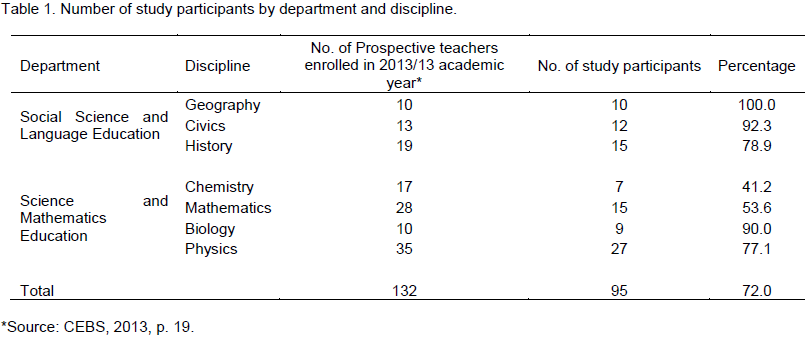
A total of 132 prospective teachers had been admitted into the seven areas of specialization of whom 95 (72.0%) took part in the study. The others missed the class that day or failed to return the questionnaire.
Instrument of data gathering
An ‘Environmental and Sustainability Literacy Questionnaire’ (ESLQ) had been developed by the author to assess the level of awareness and views of teachers and prospective teachers in Ethiopia about issues related to environment and sustainability. It has three parts. Part one seeks personal information including area of specialization; and academic performance at the end of education for their first degree (in the case of prospective teachers).
This part was meant to understand the entry profile of the prospective teachers. Part two is meant to assess the awareness of prospective teachers about environmental and sustainability issues. It has 22 statements, and respondents are asked to choose one of the three options provided for each statement: ‘correct’, ‘incorrect’ or ‘I don’t know’. Part three is meant to assess respondents' ecological/environmental value orientations. The last part has 24 statements each offering five options for respondents to choose from, namely, strongly agree, mildly agree, unsure, mildly disagree and strongly disagree.
The ESLQ was developed based on extensive review of local and global environmental and sustainability issues and problems. The draft questionnaire was then reviewed by the staff of the Institute of Environmental and Sustainability Communication (INFU), Faculty of Sustainability, Leuphana University of Lüneburg, Germany. The final version of the questionnaire was prepared after fully considering comments from colleagues at INFU, related to both content and structure of the questionnaire. Furthermore, the 15 statements that make-up the New Ecological Paradigm (NEP) Scale, developed by Dunlap et al. (2000), have been used ‘as they are’ in order to see the ecological/environmental value orientations of prospective teachers in Ethiopia as compared to participants of similar studies elsewhere in the world. The eight odd numbered items in the NEP were worded so that agreement indicates a pro-ecological view, and the seven even-numbered ones worded so that disagreement indicated a pro-ecological worldview (Dunalp et al., 2000). The NEP scale is often said to be one of the “most widely used and scrutinized methods to measure environmental orientation, attitudes and behavior" (Erdogan, 2009).
This paper reports the results of part one and part three of the ESLQ. Part three includes all the 15 statements of the NEP along with nine statements addressing ecological/environmental issues specifically related to Ethiopia.
Data gathering and analysis
The heads of the two Departments of the College of Education and Behavioral Studies which run PGDT (namely, Department of Social Science and Language Education; and the Department of Science and Mathematics Education) were contacted to seek help in the administration of the questionnaire. After discussions on the objectives and significance of the study, the Heads of the two departments agreed to take the responsibility of circulating the ESLQ among their prospective teachers in their respective departments. The questionnaires were then distributed to the participants of the PGDT in July, 2012. Table 1 shows the number of participants who took part in the study by discipline (subject area). The data gathered was fed into SPSS and then analyzed.
Entry profile
Colleges and faculties of teacher education in Ethiopia used to receive students who scored relatively lower cumulative GPA in their secondary school leaving examinations (Aklilu et al., 2008). Recently, efforts have been made, at policy1 level, to change this situation thereby enabling the various departments that train secondary school teachers to have students with a reasonably good performance in secondary school leaving certificate examinations. This study tried to look into the entry profile of the prospective secondary school teachers who were enrolled into their professional training in the summer of 2012/13 academic year. Responses as to students' performance in secondary school leaving national examinations were secured in two formats: in cumulative average points (out of the maximum of 4 cumulative average points) and raw scores (out of the maximum of 700 points). Analysis of results indicates that more than half of the participants of the study had a fairly good entry performance. For instance, more than one fourth (27%) had GPA of above 2.76 whereas 14% had scores above 276 (Table 2) when they joined their respective universities. This appears to be a clear departure from the older situation where students with the lowest GPA were placed in teacher education departments. Nevertheless, the results also show that 'high' and 'very high' achievers were still not attracted by the teaching profession (for instance, only 17% the prospective teachers had GPA above 3.0 and only 4% had scores above 350).
As indicated in the introductory section of the paper, the Ethiopian Ministry of Education introduced a new modality of teacher education called Post Graduate Diploma in Teaching (PGDT) whereby prospective
1Introduction of the Postgraduate Diploma in Teaching (PGDT) Program could be taken as an example. Students with good performance in their higher education entrance exam are first trained in subject area departments and then compete to get admission into colleges of teacher education.
graduates receive their first degree in the subject area disciplines (History, Chemistry, etc.) and then join faculties of education in the various universities for one year professional training to become a secondary school teacher in their respective subject areas. It was hoped that PGDT would be a competitive program attracting students with a better performance at the end of their university stay (CEBS, 2013). This study also tried to find out whether this hope is being actualized. Result of the study clearly shows that the PGDT indeed attracted students who scored relatively higher cumulative GPAs in their respective areas of specialization (Table 3).
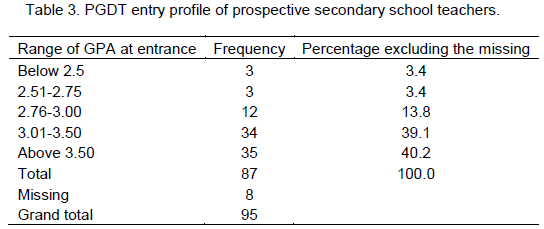
It is interesting to note that 79.3% of the students who willingly joined the PGDT had a cumulative GPA of 3.00 and above on graduation. This is indeed a good news for secondary teacher education in Ethiopia as it addresses one of the age-old concerns of teacher educators in Ethiopia that the entry profile of would be teachers was too low to help them cope up with the rigorous requirements of university education. Though a high cumulative GPA does not guarantee creation of a committed teacher, it is one of the important input factors which help the education system to generate academically competent teachers.
Ecological/environmental value orientations
This section presents the findings of the study divided into five categories of value orientations: limits to growth; fragility of natural balance; possibility of eco-crisis; anti-anthropocentrism; and rejection of human exceptionalism. Besides, results specifically related to issues concerning Ethiopia have been presented in the last part of the section.
Limits to growth (LTG)
The LTG refers to the results of the study by a group of scientists at the Massachusetts Institute of Technology who attempted to model the evolution of the worldwide economic system over a time span of more than a century (Bardi, 2011). The study shows among other things, that, in a “business as usual” set of assumptions, economic growth could not be maintained throughout the twenty-first century; and projected a gradual depletion of nonrenewable resources, coupled with increasing pollution and population growth. Three statements in the revised NEP scale are related to 'limits to growth'.
The prospective teachers who took part in this study endorsed all three statements, both pro-NEP views (Item Nos. 1(1) and 19(11) and pro-DSP (item 6(6)). It is thus to be noted that respondents endorsed the two apparently contradictory positions, namely, pro-NEP and pro-DSP at the same time. Though the magnitude of support differs, similar patterns were also reported by studies from US and Turkey (more than half of the participants supported all the three statements albeit to a different degree). In the case of Ethiopian participants, the statement which asserts that the 'earth has plenty of natural resources...' had been endorsed by overwhelming majority (85.9%). It is interesting to see that almost equal percentage of participants from Turkey (86.9%) supported this statement (Table 4). The second part of the statement, '...if we just learn how to develop them', might have led to such a high endorsement by giving the impression that any perceived or actual problem related to use of natural resources is a problem related not to availability but how we use such resources.
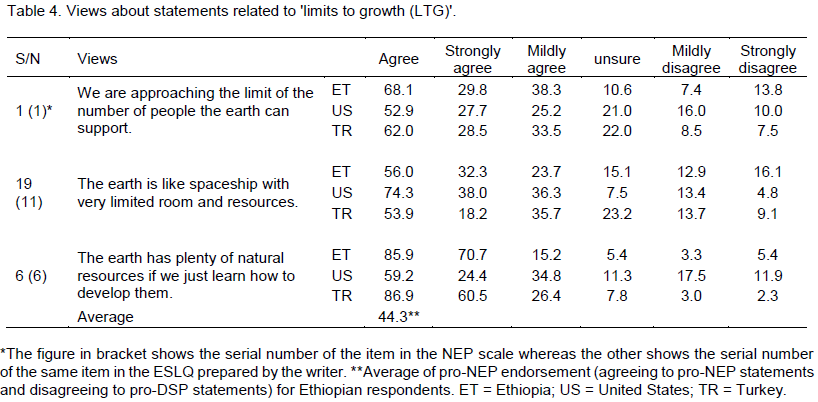
The statement which declares that the Earth has 'very limited room and resources' is endorsed by much lesser proportion of the Ethiopian respondents (56%). Once again, a similar proportion of respondents from Turkey (53.9%) supported this statement. On the other hand, close to one-third (30%) of the participants from Ethiopia rejected the view that the Earth has limited room and resources. When we see this in light of the high support to another statement which seems to contradict this one, 'we are approaching the limit of the number of people the earth can support', a degree of confusion seems to be evident. More than two-third of the respondents endorsed one of the typically biospheric views that the limit of the number of people the Earth can support is being approached. A similar trend was reported by the Turkish study on this statement (Table 4).
Erdogan (2009) tries to explain the apparent contra-dictions in the Turkish university students' views about statements related to 'limits to growth'. For some, the writer argues, the constituent parts seem unrelated; and there are some items that respondents probably cannot relate to without hesitation. The latter refers specifically to item 11 which uses “spaceship with very limited room and resources” metaphor. It is further argued that some people may agree with “limited room” idea, but disagree with “limited resources” (Erdogan, 2009). Based on these observations, Erdogan (2009) concludes that "agreeing or disagreeing with the items 1, 6 and 11 does not necessarily make a person a supporter of the NEP (or DSP) view, at least in Turkish culture".
Fragility of natural balance (FNB)
This view assumes that there is a delicate balance in nature thereby implying a need for keeping that balance while using natural resources for socio-economic development. The prospective teachers in Addis Ababa University seem to hold a pro-NEP view on two of the statements related to 'fragility of the natural balance'. Close to two-thirds of the respondents endorsed the view that human interference often leads to disastrous consequences (Item No. 3(3)). The degree of support to this statement is less than that reported by a Turkish study (1295 participants) and by far less than that reported by the US study (676 participants) (Table 5). An additional statement was included in the scale to see the view of the Ethiopian respondents about impacts of artificial insemination on livestock diversity. More than half (53.8%) of the respondents endorsed the statement which says "artificial insemination is a threat to livestock diversity in Ethiopia" (Item No. 13) whereas a very significant proportion (36%) preferred neither to agree nor disagree.
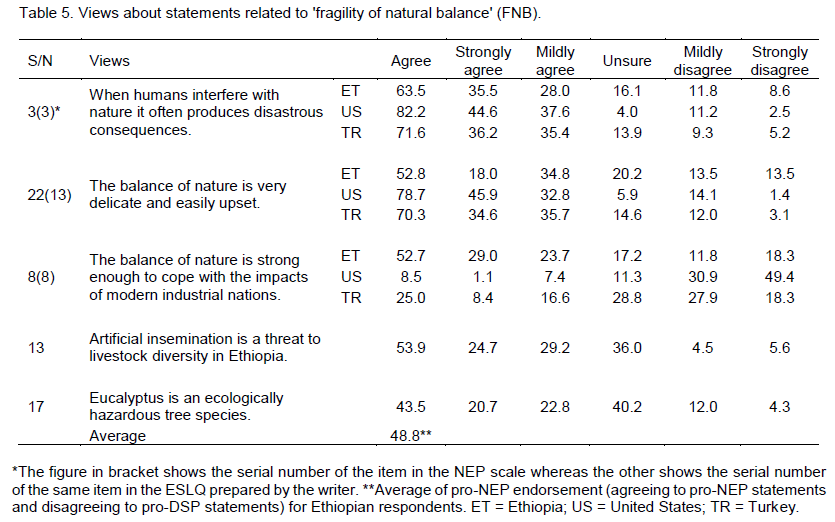
*The figure in bracket shows the serial number of the item in the NEP scale whereas the other shows the serial number of the same item in the ESLQ prepared by the writer. **Average of pro-NEP endorsement (agreeing to pro-NEP statements and disagreeing to pro-DSP statements) for Ethiopian respondents. ET = Ethiopia; US = United States; TR = Turkey.
The statement on the delicacy of the balance of nature has been endorsed by a little more than half of the Ethiopian respondents. Once again, we see a huge difference between the respondents in the three countries with regard to their degree of enthusiasm in supporting this statement (Item No. 22(13)). More than one-fourth of the respondents in Ethiopia rejected the view which asserts that the balance of nature is very delicate and hence easily upset! On the contrary, half of the Ethiopian respondents endorsed the pro-DSP view that the 'balance of nature is strong enough to cope with the impacts of modern industrial nations' (Item No. 8(8)). This is one of the statements where we see a clear difference between the views of Ethiopian respondents on the one hand and those of American and Turkish respondents on the other (Table 5). Here again, Ethiopian respondents tended to support both pro-NEP and pro-DSP views at the same time. In relation to such a pattern of values, Stern and Dietz (1994) noted that value orientations are not mutually exclusive, that is, individuals may hold several orientations to some degree.
Some people in Ethiopia (mainly environmentalists) argue that the ever increasing size of eucalyptus plan-tation is damaging the ecosystem. Among the concerns are its inability to provide quality wood or services such as watershed or soil conservation; its impact on the environment such as heavy use of soil water, thus affecting streams and underground water; high consump-tion of soil nutrients, inability to prevent soil erosion, inhibition of growth of other plants in the understory; and failure to provide food supplies or adequate habitat for wildlife (Gessesse and Teklu, 2011). It is thus interesting to see that less than half of the respondents endorsed the statement: "Eucalyptus is an ecologically hazardous tree species" (Item. No.17). A great number of the respon-dents also seemed to struggle to take a position on the impact of eucalyptus (40.2% indicated that they were unsure). This is one of the statements where respondents had difficulty to take a position.
Possibility of eco-crisis (PEC)
The NEP stresses on human dependence on nature and disastrous outcome of human interference to nature (Erdogan, 2009). Three fourth of the Ethiopian respondents endorsed the biospheric view that humans are severely abusing the environment (Item No. 12(5)). The level of endorsement to this statement is even much higher in the case of US and Turkish respondents (Table 6). With regard to the current status of the natural environment, more than half (54.4%) of the respondents seem to share the common view among Ethiopian scholars in the area of natural resource management that the country's "natural environment has been damaged beyond any chance to recover" (Item No.11). It is also interesting an alarmist view about the present state of the natural environment in the country (Table 6).
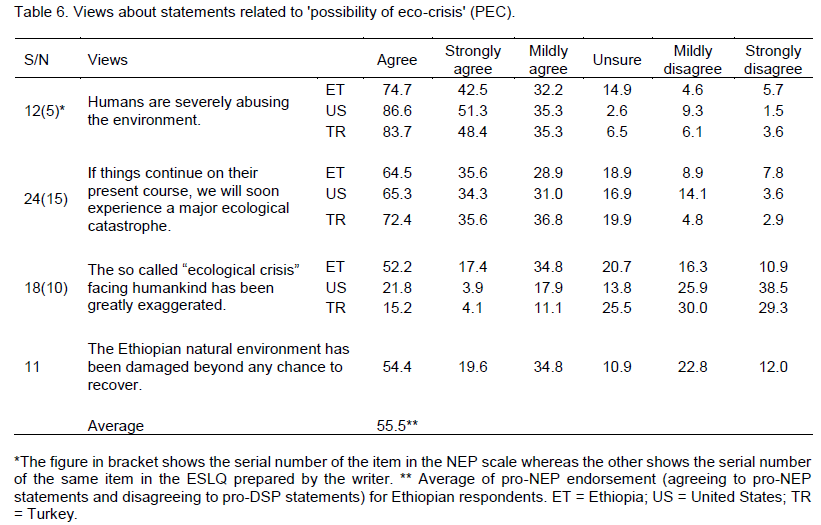
Close to two-third of the Ethiopian respondents (64.5%) endorsed the view which states that 'If things continue on their present course, we will soon experience a major ecological catastrophe' (Item No. 24(15)). Close to three fourth of the Turkish respondents endorsed this view. More than half of the Ethiopian respondents consider that 'the so called “ecological crisis” facing humankind has been greatly exaggerated' (Item 18(10)) thereby showing their support, once more, to a pro-DSP view. Table 6 shows that the proportion of US and Turkish respondents who considered 'ecological crisis' facing humanity as exaggeration is much lower. This is another case where we see a clear difference between the views expressed by the US and Turkish respondents on one hand and that of Ethiopian respondents on the other.
Anti-anthropocentrism (AATC)
The Ethiopian respondents seemed to exhibit contradictory views on the three statements related to 'anti-anthropocentrism' views. On the one hand, more than three-fourth endorsed the view that "plants and animals have as much right as humans to exist" (Item No. 14(7)). On the other, 72.8% endorsed the contradictory view that "humans were meant to rule over the rest of nature" (Item No. 21(12)). The view that promotes human dominion over nature is clearly rejected by more than half of the respondents from US and Turkey (Table 7). A similar statement which proclaims that "humans have the right to modify the natural environment to suit their needs" got support from even greater proportion of Ethiopian respondents (80.9%). More than 60% of the respondents from US and Turkey disagreed. Table 7 shows that Ethiopian respondents held a very strong anthropocentric view though they also supported the bispoheric view that calls for equal right to non-human species. Close to one-third of the respondents also endorsed the additional statement (not included in the NEP scale) meant to crosscheck the consistency of respondents' views about plant and animal right: "One should also preserve species that have no direct economic benefits at present" (Item No.4). With regard to such a tendency to support both pro- and anti-NEP views, Erdogan (2009) makes an interesting note that "one does not have to be an environmentalist in order to acknowledge the right of existence of plants and animals".
Rejection of human exceptionalism (RHE)
Two of the three statements in this category are designed in pro-DSP format and one in pro-NEP. The Ethiopian respondents endorsed all three albeit to a different degree (Table 8). The pro-DSP view that 'human ingenuity will insure
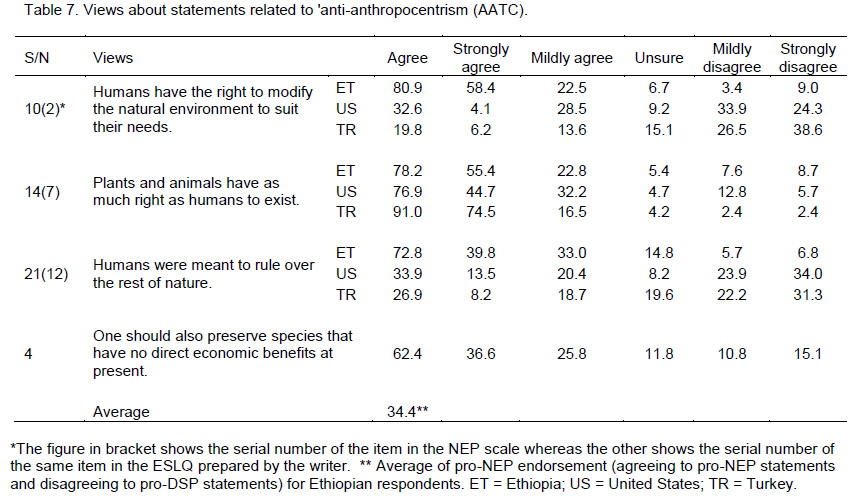
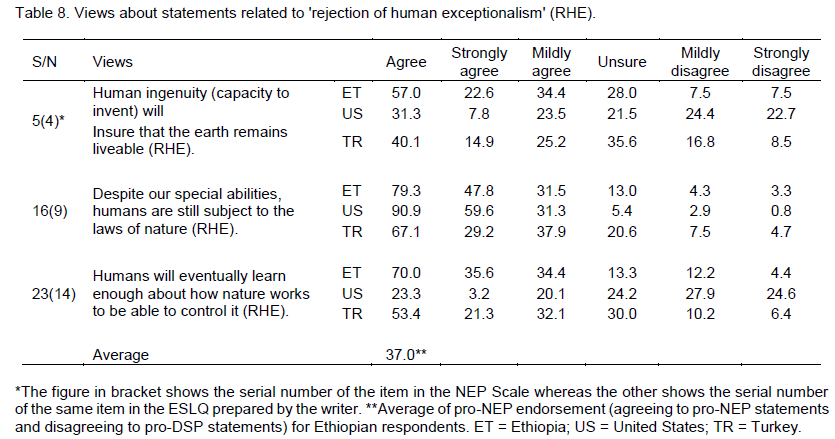
that the earth remains livable' (Item No. 5(4)) has been endorsed by more than half (57%) of the Ethiopian respondents (the level of endorsement is much less in the case of Turkish and American respondents). Another pro-DSP statement in this category declares that 'humans will eventually learn enough about how nature works to be able to control it' (Item No. 23(14)). A clearly greater proportion of the Ethiopian respondents (70%) endorsed this statement, slightly more than half of the Turkish respondents also agreed. The only pro-NEP statement in this category which says that '... humans are still subject to the laws of nature' has been endorsed by 90.1% of the US respondents. This may not be surprising given the assumption that pro-NEP statements normally get huge endorsement by respondents from industrially advanced societies. What is interesting is that 79.3% of the Ethiopian respondents also endorsed this statement which contradicts the view that humans will be able to control nature (the latter view was also endorsed by 70% of the Ethiopian respondents, as indicated above).
Ecological/environmental issues related to Ethiopia
As indicated in the methodology section, the scale used in this study has nine statements in addition to the 15 that form the revised NEP scale. Five of the nine statements are related to two of the issues causing a great deal of controversy and debate both in academic and political circles (Table 9). The first issue relates to the impact of land use policies and practices on the environment while the second relates to the impacts of one of the mega hydroelectric dams being built in southern Ethiopia: Gilgel Ghibe III Dam. Some ecologists and human rights advocates fiercely oppose the construction of the Gilgel Ghibe III on the ground that it would affect the lifestyles and livelihoods of people in the Omo Valley. These groups also argue that the Dam could also lead to significant fall in the amount of water that reaches Lake Turkana. The Ethiopian Government, on the other hand, rejects both assertions as groundless.
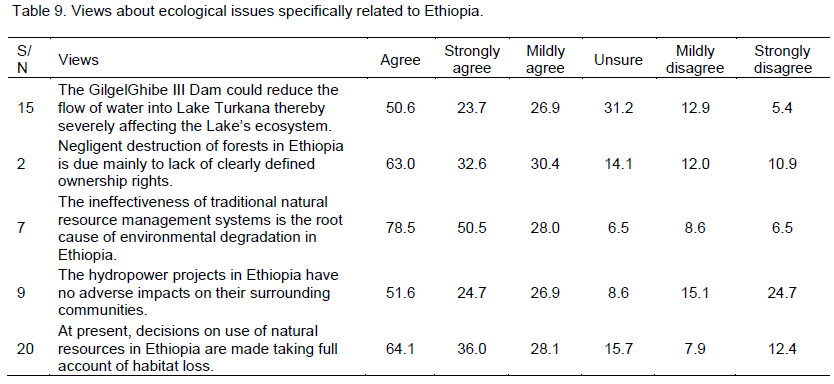
A little more than half of the prospective teachers (51.6%) endorsed the position held by the Ethiopian Government that "hydropower projects in Ethiopia have no adverse impacts on their surrounding communities" (Item No.9). It is also interesting to see that a significant pro-portion of the students (39.8%) rejected this view which pronounces that dams in Ethiopia are free from adverse impacts. This is a clear departure from the view frequently conveyed on the Ethiopian public media. The more bio-centirc view that 'The Gilgel Ghibe III Dam could reduce the flow of water into Lake Turkana thereby severely affecting the Lake’s ecosystem' (Item No.15) has been endorsed by half of the respondents. Nearly one third of the respondents found it difficult either to agree or disagree with the statement related to the impact of Gilgel GhibeIII Dam on the ecosystem of Lake Turkana.
The mode of land ownership is believed to have direct impact on protection of natural resources. The mainline argument is that private ownership encourages better management of resources. Close to two-third (63%) of the respondents endorsed the statement that "negligent destruction of forests in Ethiopia is due mainly to lack of clearly defined ownership rights" (Item No.2). A higher proportion (78.5%) of respondents agrees that "The ineffectiveness of traditional natural resource manage-ment systems is the root cause of environmental degradation in Ethiopia" (Item No.7). Environmentalists in Ethiopia often argue that the current use of natural resources in Ethiopia does not give due consideration to habitat loss associated therewith. Nevertheless, about two-third of the respondents endorsed the view that "at present, decisions on use of natural resources in Ethiopia are made taking full account of habitat loss" (Item No.20).
Values are widely believed to affect people's actions for good or bad. The value orientation of a person is highly likely to affect his/her beliefs about the consequences of attitude objects for the things a person values; and thus has consequences on that person's attitudes and behavior (Stern and Dietz, 1994). Values may act as filters for information, influencing beliefs by leading people to accept information selectively. Someone who values economic development above other social goals may be likely to accept information suggesting that environmental protection will compromise economic goals whereas someone who values the physical beauty of nature above other social objects may accept information that supports a belief that any environmental change is a threat to that value (Stern and Dietz, 1994). Similarly, an individual who holds strong egoistic or materialistic values tends to deny that human activities are harmful to nature. On the other hand, an individual who values the biosphere for its own sake tends to accept the proposition that human activities threaten natural systems (Stern and Dietz, 1994). This is, however, only one side of the matter. The relationship between value and action is often colored by many factors including cultural background and level of technological advancement.
In Ethiopia, the past two decades witnessed remarkable developments in promulgation of policies related to environment and development. A series of proclamations related to environment and sustainable development have been issued; and offices in charge of environmental protection established both at federal and regional levels. Furthermore, Ethiopia showed her unwavering commitment to building what she calls a 'climate-resilient green economy' (EPA, 2011). The country's plan to build a green economy comprises actions to reduce greenhouse gas emissions while safeguarding economic growth (“green economy”) as well as adaptation initiatives to reduce vulnerability to the effects of climate change (“climate resilience”) (EPA,
2011). Whether these and other policy provisions are used to improve the ways in which environmental- and sustainability issues have been addressed in Ethiopian institutions of higher education is not systematically investigated.
The study reported in this paper tried to see the ecological/environmental value orientations of prospective secondary school teachers enrolled at Addis Ababa University for a one year Postgraduate Diploma in Teaching program. The results show two very interesting trends. First, all the eight pro-NEP and the seven pro-DSP statements have been endorsed by the respondents albeit to a different degree. Second, the level of agreement with the two apparently contradictory groups of statements happened to be almost exactly the same (with an average of 67.1% endorsement for pro-NEP statements and strikingly equal level of endorsement of 67.4% for pro-DSP statements). In the first instance, the writer was bewildered by the results having a difficulty to internalize how the two apparently opposing views could be endorsed at the same time. Careful review of both the theory on value orientation and result of empirical studies conducted elsewhere shows that such a trend has not only a theoretical backing but also an empirical support.
Stern and Dietz (1994) make an important note that the major ecological value orientations, often presented as independent, are not mutually exclusive, that is, individuals may hold several orientations to some degree. They argue that those who believe human actions are having an adverse effect on the biosphere and who assign value to such effects are more, rather than less, likely than others to perceive and be concerned with adverse effects on human beings. Corral-Verdugo and Armendariz (2000), analyzed the covariances between factors to see whether the Mexican population studied held either a dualistic (NEP vs. HEP) or syncretic (NEP plus HEP) worldview. The highest values were obtained for the pro-NEP items “humans must live in harmony with nature” and “the balance of nature is delicate,” whereas the lowest values corresponded to the HEP statements “humans have the right to modify the natural environment” and “plants and animals exist primarily to be used by humans.” In general, the pro-NEP items elicited higher acceptance. Their study also showed a moderate level of agreement with the HEP among the participants" (Corral-Verdugo and Armendariz, 2000).
The study reported here, like the one by Corral-Verdugo and Armendariz (2000), shows that the prospective secondary school teachers hold a syncretic (NEP plus HEP) not a dualistic (NEP vs. HEP) worldview. In fact, a closer look at the patterns of responses to the five categories of value orientations shows that respondents had, on average, a pro-DSP worldview in four of the five categories. The only category where respondents had a pro-NEP view (no matter how marginal- an average of 55.5% endorsed pro-NEP) relates to 'possibility of eco-crisis'. In all other categories, the proportion of respondents who endorsed pro-NEP was less than 50% showing that, on average, the participants of this study were less concerned with 'fragility of natural balance', and 'limits to growth', and, on the other hand, are not willing to reject 'anthropocentrism' and 'human exceptionism'. In fact, the two statements which got more than 80% endorsement are both pro-DSP: "The earth has plenty of natural resources if we just learn how to develop them" (85.9% endorsement); and "humans have the right to modify the natural environment to suit their needs" (80.9% endorsement). At present, the most pressing concern in Ethiopia seems to be poverty eradiation (at any cost). This concern seems to be widely shared both by political leaders and religious fathers. The tendency to endorse anti-NEP worldview can also be seen from this angle. Hence a suggestion that communities characterized by local rather than global perspectives were less likely to reflect a pro-NEP perspective on environmentalism (Gooch, 1995; Watson and Halse, 2005).
Participants' responses to the additional statements, specifically related to Ethiopia, show a similar trend. On the one hand, half of the participants agree that the 'Gilgel Ghibe III Dam could reduce the flow of water into Lake Turkana thereby severely affecting the Lake’s ecosystem'; and, on the other, almost equal proportion endorsed the view that the 'hydropower projects in Ethiopia have no adverse impacts on their surrounding communities'. A similar contradiction is also to be seen in statements related to natural resource management. Close to two-third of the respondents agree that 'decisions on use of natural resources in Ethiopia are made taking full account of habitat loss'. An equal proportion endorsed the statement which suggests that Ethiopia lacks 'clearly defined ownership rights' and this is a cause for the negligent destruction of forests in the country.